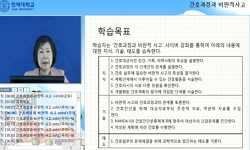The purpose of this study is to obtain basic data for the purpose of training electrical engineering professionals by analyzing and comparing the thinking process of experts and novices in resolving problems occurring in electric circuits. Four profes...
http://chineseinput.net/에서 pinyin(병음)방식으로 중국어를 변환할 수 있습니다.
변환된 중국어를 복사하여 사용하시면 됩니다.
- 中文 을 입력하시려면 zhongwen을 입력하시고 space를누르시면됩니다.
- 北京 을 입력하시려면 beijing을 입력하시고 space를 누르시면 됩니다.

전기회로 문제해결에서 전문가와 초보자의 사고 과정 분석 = An Analysis of Expert's and Novice's Thinking Process in Problem Solving of Electric Circuit
한글로보기https://www.riss.kr/link?id=A103795845
- 저자
- 발행기관
- 학술지명
- 권호사항
-
발행연도
2012
-
작성언어
Korean
-
주제어
문제해결 과정 ; 사고 과정 ; 전문가 ; 초보자 ; 전기회로 ; Problem solving process ; Thinking Process ; Expert and Novice ; Electric Circuit
-
등재정보
KCI등재
-
자료형태
학술저널
- 발행기관 URL
-
수록면
169-191(23쪽)
-
KCI 피인용횟수
2
- 제공처
-
0
상세조회 -
0
다운로드
부가정보
다국어 초록 (Multilingual Abstract)
The purpose of this study is to obtain basic data for the purpose of training electrical engineering professionals by analyzing and comparing the thinking process of experts and novices in resolving problems occurring in electric circuits.
Four professors of electrical engineering and seven university students who had taken a subject on electric circuit participated in the study, as experts and novices respectively. Each participant was asked to solve electric circuit problems with differing levels of complexity of high, medium, and low, using the think-aloud protocol. The performance of individual participants was recorded with a tablet PC and a video camera. The recordings were used for the analysis of the thinking process based on the codes of problem-solving processes. The coding was done using InterAct 8.
The differences between the two groups were identified as follows.
Firstly, the frequency of performance and the time required for each stage of problem solving were different between the groups depending on the complexity of problems. With high-complexity problems, the novices showed a higher frequency and required more time for understanding (U) and evaluation (E), whereas the experts for planning (P). With medium-complexity problems, the novices showed a higher frequency and required more time for evaluation (E), whereas the experts for planning (P). With low-complexity problems, the novices showed a higher frequency and required more time for planning (P), whereas the experts for understanding (U) and evaluation (E).
Secondly, the frequency of performance and the time required for each problem solving activity were different between the groups depending on the complexity of problems. With high-complexity problems, the experts showed a higher frequency and required more time for specifying the circuit (U4), confirming the applied method (P1), and doing mathematics (C3), whereas the novices for reading the problem (U1), specifying the problem (U3) and evaluating the solution (E4). With medium-complexity problems, the experts showed a higher frequency and required more time for confirming the applied method (P1), transforming the circuit (C1) and evaluating the solution (E4), whereas the novices for doing mathematics (C3) and evaluating the mathematical process of problem solving (E3). With low-complexity problems, the experts showed a higher frequency and required more time for specifying the circuit (U4), transforming the circuit (C1), doing mathematics (C3), evaluating the problem at hand (E1) and evaluating the solution (E4), whereas the novices for reading the problem (U1) and confirming the circuit (U2).
국문 초록 (Abstract)
이 연구의 목적은 전기회로 문제 해결에서 전문가와 초보자의 사고 과정을 분석하여 그 차이를 구명하고, 전기공학 분야의 전문가 양성을 위한 교육의 기초 자료를 확보하기 위함이다. 연구...
이 연구의 목적은 전기회로 문제 해결에서 전문가와 초보자의 사고 과정을 분석하여 그 차이를 구명하고, 전기공학 분야의 전문가 양성을 위한 교육의 기초 자료를 확보하기 위함이다.
연구 목적 달성을 위하여 전기공학 전공 교수 4명과 전기회로 과목을 이수한 대학생 7명을 연구 대상으로 하였다. 교수 4명은 전문가로 분류하였으며, 대학생 7명은 초보자로 분류하였다. 연구 대상은 주어진 상, 중, 하의 난이도를 가지는 전기회로 문제를 개별적으로 발성 사고법을 통하여 해결하였다. 전기회로 문제의 해결 과정은 Tablet PC와 비디오 카메라를 활용하여 녹화하였다. 녹화된 영상은 문제해결 과정 코드에 기반한 문제해결 사고 과정 분석에 활용되었으며, 녹화된 영상에 대한 코딩은 InterAct 8 소프트웨어를 사용하였다.
이 연구를 통한 전기회로 문제 해결에서 전문가와 초보자의 사고 과정 차이는 다음과 같다.
첫째, 전기회로 문제 수준에 따라 전문가와 초보자는 문제해결 단계별 수행 빈도 비율과 소요 시간 비율이 서로 다르다. 문제해결 단계에서 난이도에 따라 ‘상’ 난이도에서 초보자는 이해 단계(U)와 평가 단계(E), 전문가는 계획 단계(P), ‘중’ 난이도에서 초보자는 평가 단계(E), 전문가는 계획 단계(P), ‘하’ 난이도에서 초보자는 계획 단계(P), 전문가는 이해 단계(U)와 평가 단계(E)에서 더 많은 빈도를 나타내고 더 많은 시간을 소비하는 것으로 나타났다.
둘째, 전기회로 문제 수준에 따라 전문가와 초보자는 문제해결 활동별 수행 빈도와 소요 시간이 서로 다르다. 문제해결 활동에서 난이도에 따라 ‘상’ 난이도에서 전문가는 회로 구체화하기(U4), 적용 방법 확인하기(P1), 수학식 전개하기(C3)에, 초보자는 문제 읽기(U1), 문제 구체화하기(U3), 도출된 답 평가하기(E4)에, ‘중’ 난이도에서 전문가는 적용 방법 확인하기(P1), 회로 변형하기(C1), 도출된 답 평가하기(E4)에, 초보자는 수학식 전개하기(C3), 수학적 문제 해결과정 평가하기(E3)에, ‘하’ 난이도에서 전문가는 회로 구체화하기(U4), 회로 변형하기(C1), 수학식 전개하기(C3), 주어진 문제 평가하기(E1), 도출된 답 평가하기(E4)에, 초보자는 문제 읽기(U1), 회로 확인하기(U2)에 더 많은 빈도를 나타내며 더 많은 시간을 소비하는 것으로 나타났다.
참고문헌 (Reference)
1 김태훈, "효율적·비효율적 문제 해결자의 기술적 문제 해결 과정 비교 분석" 충남대학교 대학원 2007
2 현석훈, "항공관제 상황인식에서 전문가와 초보자의 시선추적 및 프로토콜 분석" 대한인간공학회 26 (26): 17-24, 2007
3 송현순, "초등학생의 실과 문제해결에 대한 미시발생학적 분석" 한국교원대학교 대학원 2001
4 전명훈, "악보 읽기에서 나타나는 전문가와 초보자의 작업기억에서의 처리 유형의 차이" 한국감성과학회 6 (6): 3-3, 2003
5 李誠旺, "물리 문제 해결 과정에서의 전문가와 초심자의 사고 과정의 비교 분석" 韓國敎員大學校 大學院 1987
6 洪美英, "문제와 문제해결자의 특성이 화학 문제해결에 미치는 영향" 서울大學校 大學院 1995
7 은태욱, "뇌 기능 분화에 기반한 공업계 고등학교 전기회로 교과서 내용의 분석" 한국기술교육학회 8 (8): 147-166, 2008
8 Trotter, R. J., "The mastery of mastery" 32-38, 1986
9 Welch, M., "The Strategies used by ten grade 7 students working in single sex dyads to solve a technological problem" McGill University of Montreal 1996
10 Bhaskar, R., "Problem solving in semantically rich domains : An example from engineering thermodynamics" 1 : 193-215, 1977
1 김태훈, "효율적·비효율적 문제 해결자의 기술적 문제 해결 과정 비교 분석" 충남대학교 대학원 2007
2 현석훈, "항공관제 상황인식에서 전문가와 초보자의 시선추적 및 프로토콜 분석" 대한인간공학회 26 (26): 17-24, 2007
3 송현순, "초등학생의 실과 문제해결에 대한 미시발생학적 분석" 한국교원대학교 대학원 2001
4 전명훈, "악보 읽기에서 나타나는 전문가와 초보자의 작업기억에서의 처리 유형의 차이" 한국감성과학회 6 (6): 3-3, 2003
5 李誠旺, "물리 문제 해결 과정에서의 전문가와 초심자의 사고 과정의 비교 분석" 韓國敎員大學校 大學院 1987
6 洪美英, "문제와 문제해결자의 특성이 화학 문제해결에 미치는 영향" 서울大學校 大學院 1995
7 은태욱, "뇌 기능 분화에 기반한 공업계 고등학교 전기회로 교과서 내용의 분석" 한국기술교육학회 8 (8): 147-166, 2008
8 Trotter, R. J., "The mastery of mastery" 32-38, 1986
9 Welch, M., "The Strategies used by ten grade 7 students working in single sex dyads to solve a technological problem" McGill University of Montreal 1996
10 Bhaskar, R., "Problem solving in semantically rich domains : An example from engineering thermodynamics" 1 : 193-215, 1977
11 De Groot, A. D., "Perception and memory versus thought : Some old ideas and recent findings, In Problem solving : Research, method and theory" Wiley 1966
12 Smith, M. U., "Knowledge structures and the nature of expertise in classical genetics" 7 : 287-302, 1990
13 Chi, M. T. H., "Experts in problem solving, In Advances in the psychology of human intelligence" Erlbaum 7-75, 1982
14 Elson, J. L., "Expert and Novice Performance in an Industrial Engineering Scaled World Simulation" The Ohio State University 2003
동일학술지(권/호) 다른 논문
-
- 한국기술교육학회
- 이명훈
- 2012
- KCI등재
-
오토마타(automata) 만들기를 통한 STEAM 통합 기반의 창의 설계 교육 프로그램 개발 및 적용
- 한국기술교육학회
- 이창훈
- 2012
- KCI등재
-
기술교과에서 다중지능을 활용한 만들기 체험활동의 수업모형 개발 -음악지능을 중심으로-
- 한국기술교육학회
- 임미가
- 2012
- KCI등재
-
통합적 STEM 교육이 일반고등학교 학생의 과학 및 기술교과 자기효능감과 공학 태도에 미치는 효과
- 한국기술교육학회
- 성의석
- 2012
- KCI등재
분석정보
인용정보 인용지수 설명보기
학술지 이력
| 연월일 | 이력구분 | 이력상세 | 등재구분 |
|---|---|---|---|
| 2026 | 평가예정 | 재인증평가 신청대상 (재인증) | |
| 2020-01-01 | 평가 | 등재학술지 유지 (재인증) |  |
| 2017-01-01 | 평가 | 등재학술지 유지 (계속평가) |  |
| 2014-01-08 | 학술지명변경 | 외국어명 : 미등록 -> THE KOREAN JOURNAL OF TECHNOLOGY EDUCATION |  |
| 2013-01-01 | 평가 | 등재학술지 유지 (등재유지) |  |
| 2010-01-01 | 평가 | 등재학술지 유지 (등재유지) |  |
| 2007-01-01 | 평가 | 등재학술지 선정 (등재후보2차) |  |
| 2006-01-01 | 평가 | 등재후보 1차 PASS (등재후보1차) |  |
| 2004-01-01 | 평가 | 등재후보학술지 선정 (신규평가) |  |
학술지 인용정보
| 기준연도 | WOS-KCI 통합IF(2년) | KCIF(2년) | KCIF(3년) |
|---|---|---|---|
| 2016 | 1.52 | 1.52 | 1.72 |
| KCIF(4년) | KCIF(5년) | 중심성지수(3년) | 즉시성지수 |
| 1.66 | 1.72 | 2.247 | 0.44 |




 KCI
KCI






